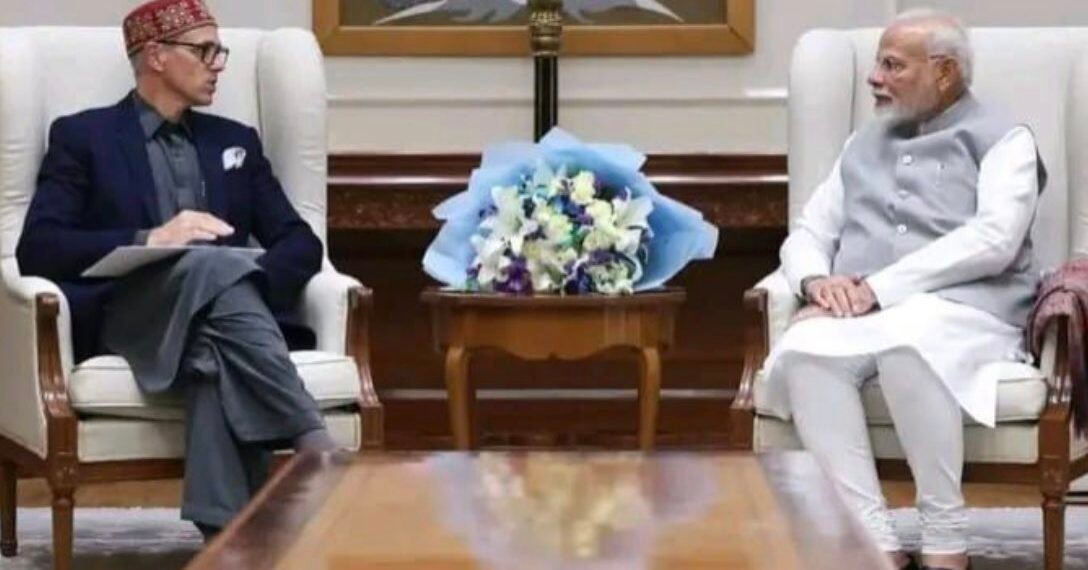“Kashmir to Kevadia! Good to see Shri Omar Abdullah Ji enjoying his run at the Sabarmati Riverfront and visiting the Statue of Unity.
By PC Bureau
A public display of warmth between Jammu and Kashmir Chief Minister Omar Abdullah and Prime Minister Narendra Modi has sent ripples through political circles, just days before the sixth anniversary of the abrogation of Articles 370 and 35-A on August 5.
The exchange, sparked by Abdullah’s visit to Gujarat for a tourism event, underscores a rare moment of unity between two leaders with historically opposing views on Kashmir’s political status, fueling debates about its implications.
The interaction began when Abdullah, in Ahmedabad for a tourism event, shared a post on X about his morning run along the Sabarmati Riverfront. “While in #Ahmedabad for a tourism event, I took advantage of being here to get my morning run at the famed Sabarmati Riverfront promenade. It’s one of the nicest places I’ve been able to run & it was a pleasure to get to share it with so many other walkers/runners. I even managed to run past the amazing Atal Foot Bridge,” he wrote.
Prime Minister Modi responded swiftly on X, framing the visit as a symbol of national integration.
“Kashmir to Kevadia! Good to see Shri Omar Abdullah Ji enjoying his run at the Sabarmati Riverfront and visiting the Statue of Unity. His visit to SoU gives an important message of unity and will inspire our fellow Indians to travel to different parts of India,” Modi posted, referencing Kevadia, home to the Statue of Unity.
Abdullah reciprocated, emphasizing the importance of tourism for Jammu and Kashmir’s economy. On Friday, he wrote on X, “I’m a firm believer that travel broadens the horizons & the mind
@narendramodi
ji. It’s especially important for us in J&K as tourism is a crucial part of our economy & has the potential to gainfully employ lakhs of people. That’s why I & my colleagues are trying to convince more of our fellow Indians to visit J&K, especially after the tragic events earlier this year.”
During his two-day Gujarat visit, Abdullah also toured the Sabarmati Ashram, a site synonymous with Mahatma Gandhi’s legacy.
Reflecting on the experience, he posted, “My visit to Ahmedabad is now complete. I feel both humbled & privileged to have been shown around the Sabarmati Ashram of the Father of the Nation, Mahatma Gandhi.
His teachings ring true even today & point us in the direction we should take, but seldom do.” Quoting Gandhi, he added, “True democracy cannot be worked by twenty men sitting at the centre. It has to be worked from below by the people of every village.”
He also shared a personal anecdote: “I was also able to try my hand with a Charkha. I had a very patient teacher who tried to teach me to spin cotton in the same way that Gandhi ji did decades ago.”
This exchange comes at a pivotal moment, as the sixth anniversary of the abrogation of Articles 370 and 35-A approaches.
READ: Magnus Carlsen Wins Inaugural Chess Esports World Cup
On August 5, 2019, the Modi government revoked Jammu and Kashmir’s special status, a decision that remains deeply divisive. Abdullah, a vocal critic, expressed disappointment over the Supreme Court’s 2023 verdict upholding the abrogation, stating on X, “Disappointed but not disheartened. The struggle will continue.”
The public camaraderie has sparked intense speculation.
Earlier, in January 2025, at the Z-Morh Tunnel inauguration in Sonamarg, Abdullah praised Modi for ensuring free and fair elections in Jammu and Kashmir while urging statehood restoration. Modi responded, “Everything has time and it’ll be fulfilled,” signaling cautious cooperation. The event, attended by Lieutenant Governor Manoj Sinha, highlighted a shared stage of federalism.














